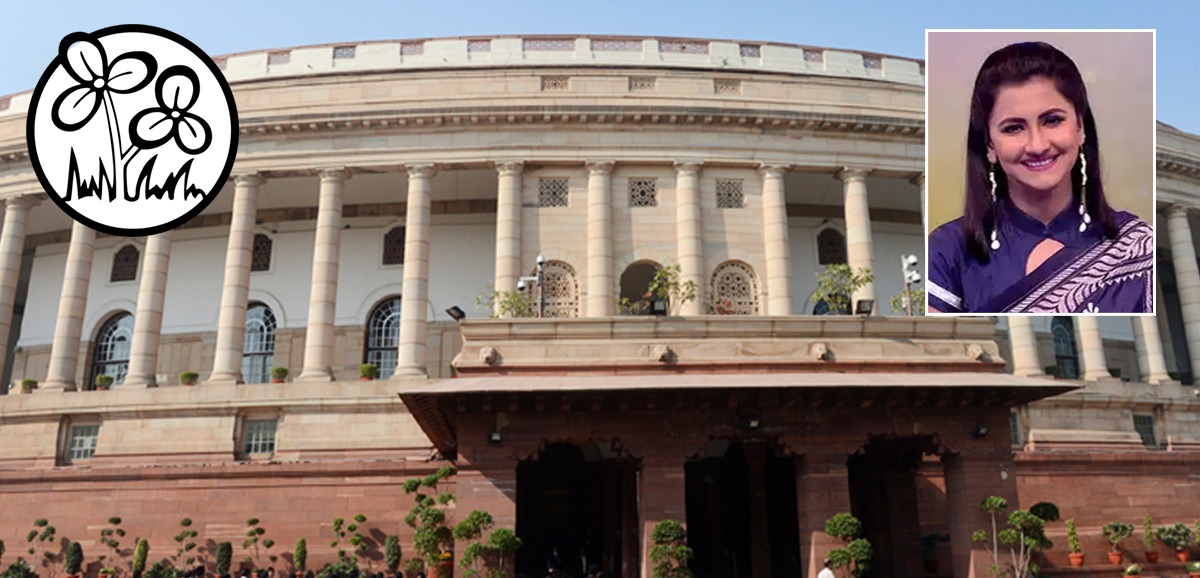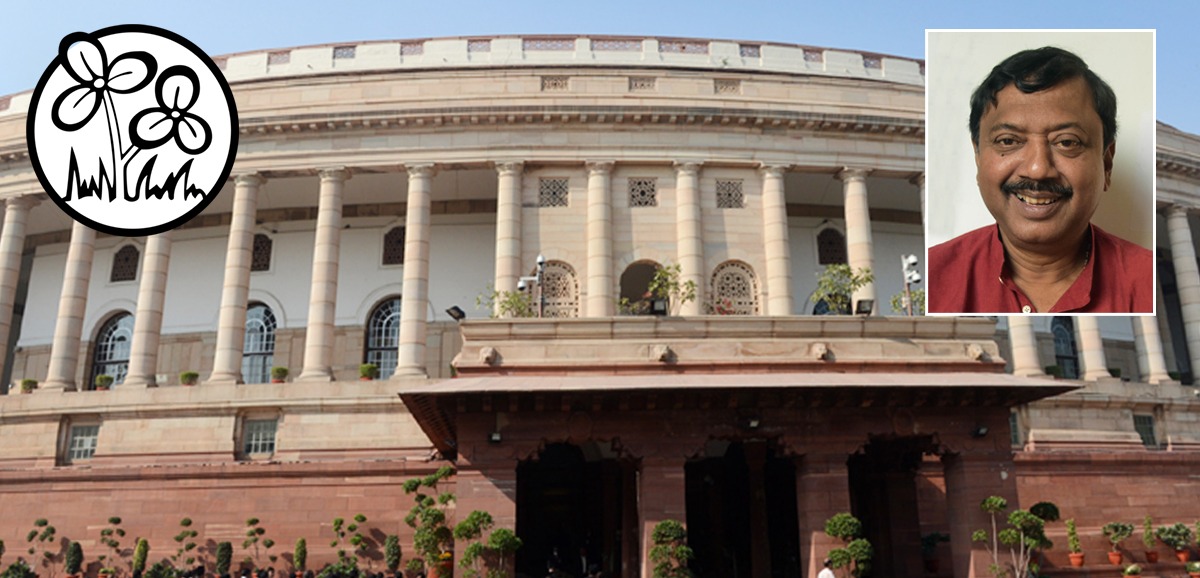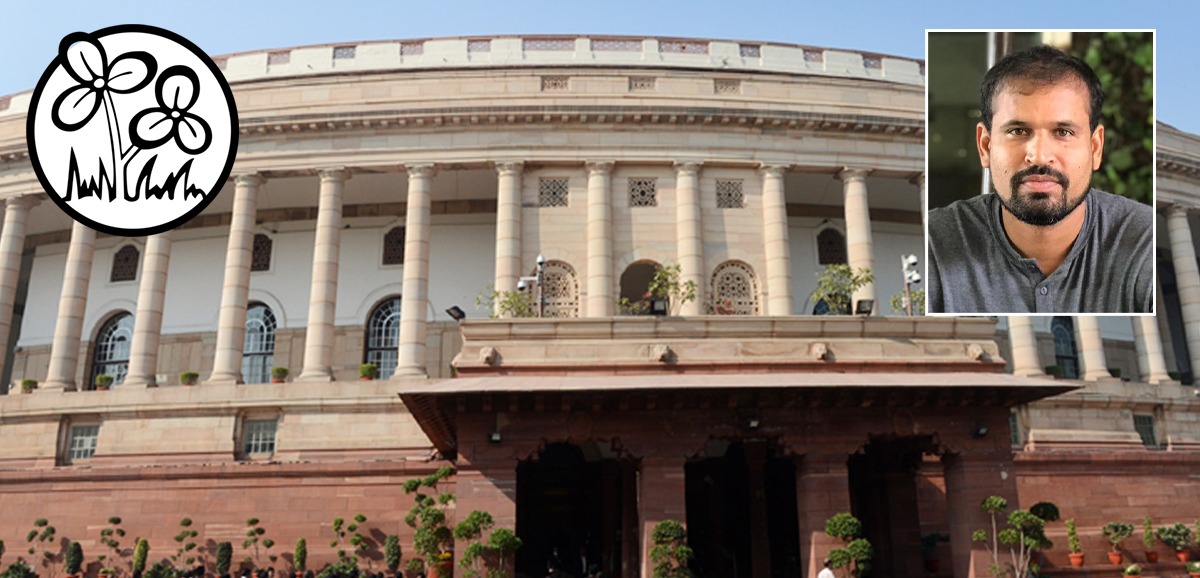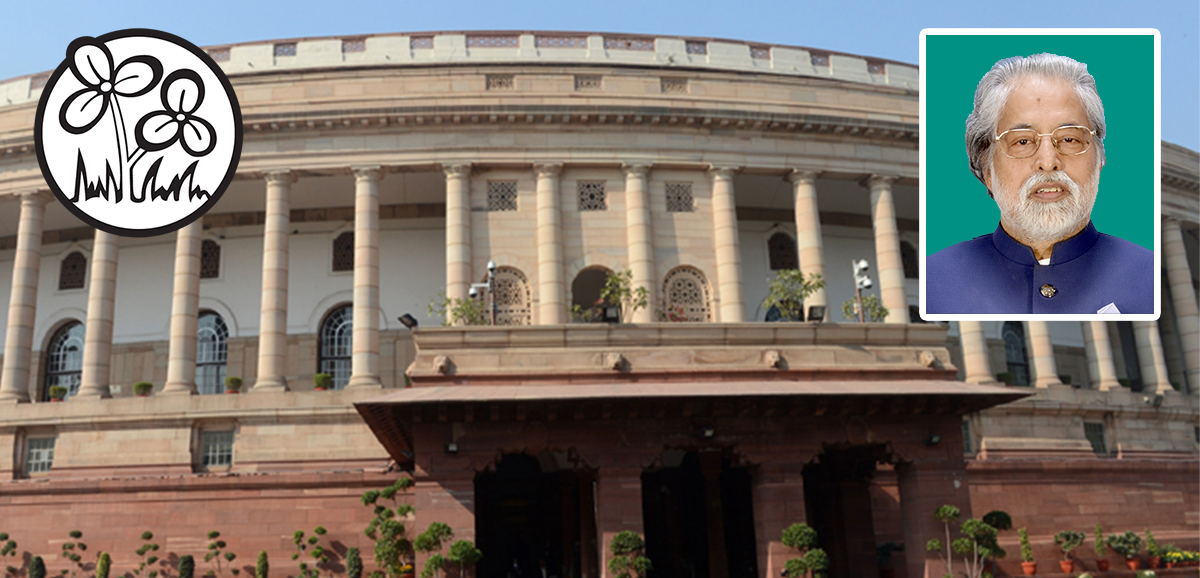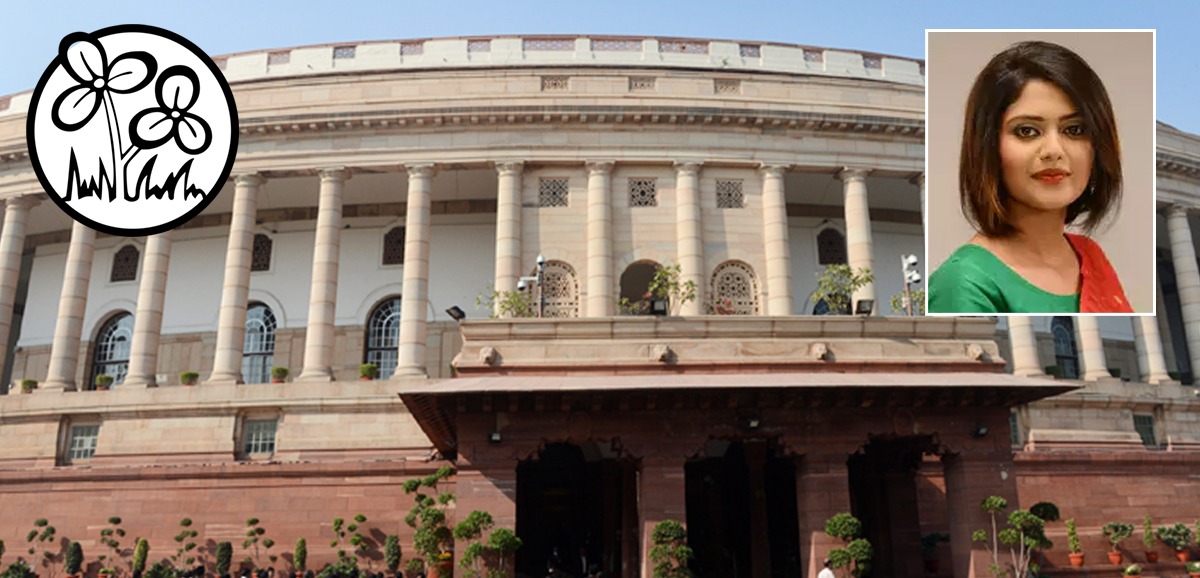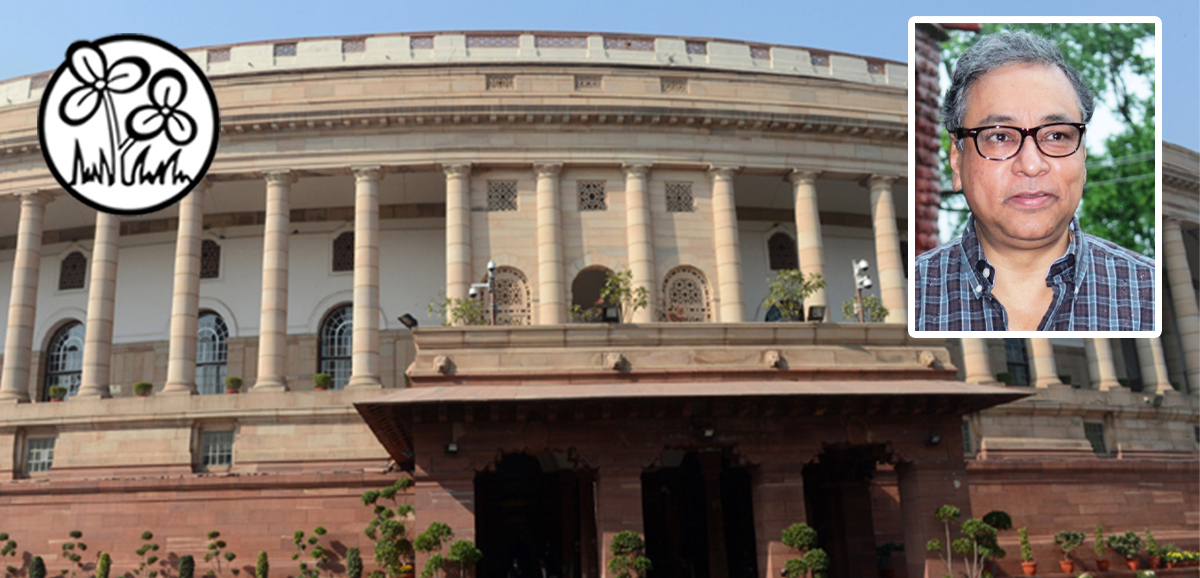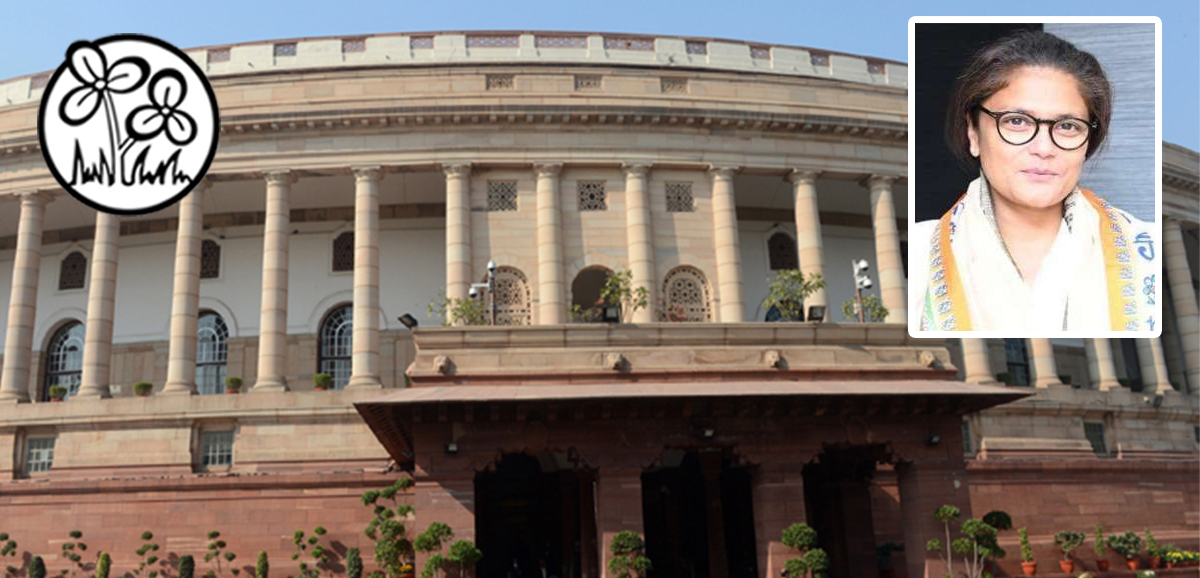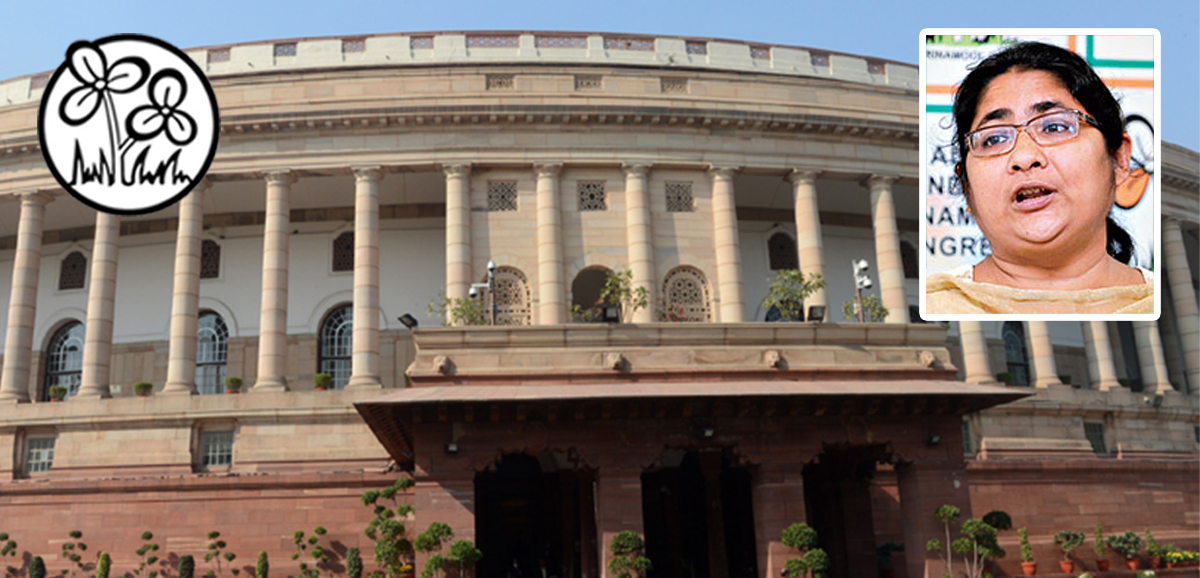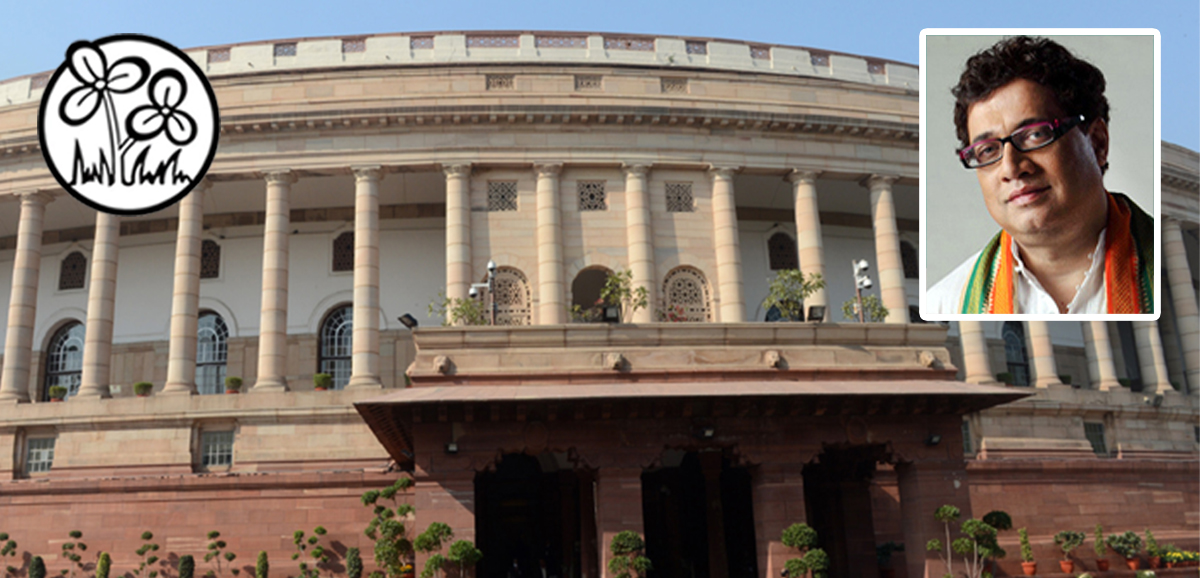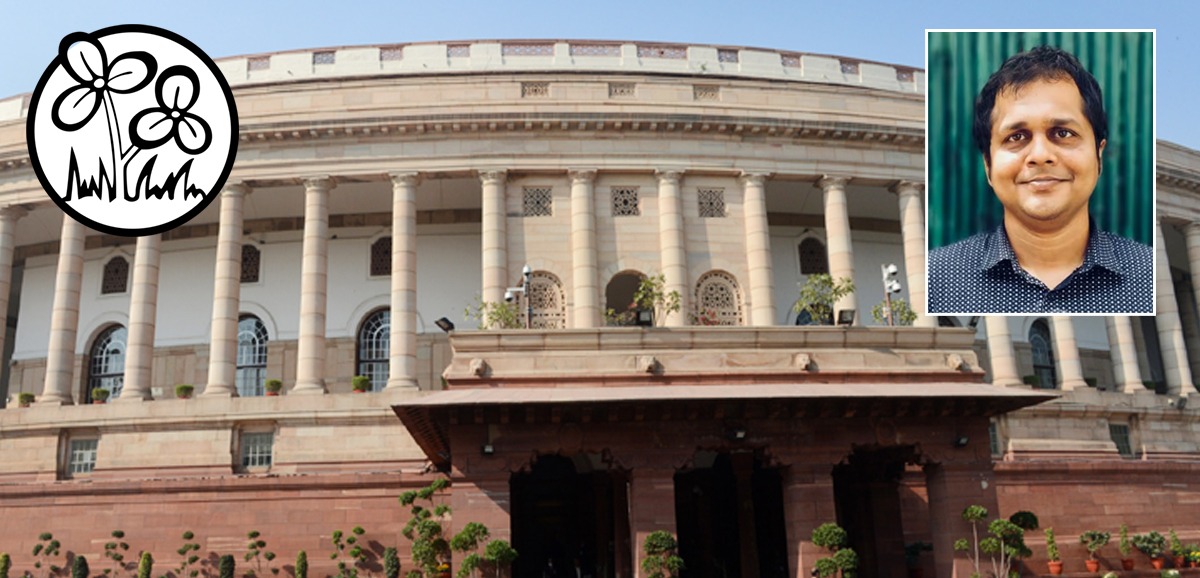अध्यक्ष महोदय, आपनेमझुेबोलनेका मौका धदया, उसके धलए मैं आपका धन्यवाद करती ह ं। मैंजादवपरु लोक सभा क्षेत्र सेपहली बार चनुकर इस सदन मेंआई ह ं। मैंअपनी लीडर ममता बनजी जी, अधभर्षेक बनजी जी और जादवपरु लोक सभा क्षेत्र के सारेवोटरों को धन्यवाद देना चाहती ह ं, धजन्होंनेमझुेभारी बहुमत सेधजताया तिा इस सदन मेंभेज कर बीजेपी को एक पैगाम धदया धक पधश्चम बंगाल में… सर, मैंजादवपरु लोक सभा क्षेत्र के लोगों को धन्यवाद देना चाहती ह ं, धजन्होंनेमझुेभारी बहुमत सेयहां पर धजता कर भेजा और यह पैगाम धदया धक पधश्चम बंगाल मेंनफरत की रणनीधत तिा धोखेबाजी की राजनीधत नहीं चलेगी। अध्यक्ष महोदय, मैंउम्मीद करं गी धक आज आप मझुेपूरा बोलनेका मौका दें। क्योंधक हाल ही मेंनीधत आयोग की जो मीधटंग हुई िी, वहां पर हमारी माननीय मख्ुय मंत्री जी, जो देश की एकमात्र मधहला मख्ुय मंत्री भी हैं, उनका माइक बीच राह मेंऑफ कर धदया गया। वह बंगाल के … अर, े अभी तो शरुुआत है। यह तो रेलर है, धपक्चर बाकी है। अध्यक्ष महोदय, मैंआपसेयह बोलना चाहती ह ं धक वेबंगाल के हक के धलए यहां पर सवाल उठानेआई िीं, वेबंगाल के लोगों की बात रखनेयहांपर आई िीं, लेधकन उनका माइक ऑफ कर धदया गया। मैंआपके माध्यम सेइस सदन मेंउपध्ित, वहां जो सद्य बैठेहैं… सर, एक लाइन… : सर, मैंयही बताना चाहती ह ूँधक बंगाल के लोगों का का काम धकया गया हैऔर उनकी आवाज़ को बंद करनेका काम धकया गया। आगेजाकर बंगाल के लोग आपकी पाटी का माइक ऑफ कर देंगे। बस एक चनुाव बाकी है, आप देख लीधजएगा।… सर, ऑल इंधडया तणृ मूल कांग्ेस पाटी इस सदन और इस देश की िडा लाजे्ट अपॉधजशन पाटी है। हम आपको धन्यवाद देतेहैंधक आपनेहमेंरले वे, ्वा््य, धशक्षा और आज पशपुालन जैसेमहत्सवपूणा धवर्षय पर चचाा मेंशाधमल होनेका मौका धदया। ऑल इंधडया तणृ मूल कांग्ेस पाटी आगेहर महत्सवपूणा मद्दुेपर बात करगे ी, चाहेवह चीन का अनैधतक रप सेइस देश में प्रवेश का मद्दुा हो या700 सेऊपर आन्दोलनजीवी धकसानों की मौत हो… सर, मैंउसी पर आ रही ह ।ूँ सर, नीट के घोटालेसेलेकर जीएसटी केबोझ तक, एयरपोटाकी छत टूट जानेसेलेकर रले पटरी सेछूट जानेतक, तणृ मूल कांग्ेस पाटी के सांसद देश के हर गंभीर मद्दुेपर चचााकरगेंे। बस मझुेयही आपसेकहना िा। Respected, Sir, Maa Maati Manush is the Magna Carta of the governance of West Bengal and our party and I feel truly honoured that today I have been given the opportunity to talk on a Ministry which is intrinsic to the Maa Maati Manush of the country. हमारेधकसान अपनेमवेशी को, अपनी फसलों को माूँ की तरह पूजतेहैं। वेधजस खेत मेंहल चलातेहैं, उस जमीन को नमन करतेहैं। But does this major sector get support from the Government? Sir, Indian agriculture supplies around 58 per cent of India’s livelihood and as a principal source of income for half of the population accounts for 17 to 18 per cent of the country’s GDP. About 70 per cent of India’s rural poor depend on livestock and farm animals. But does this sector get what it deserves? अगर इसका जवाब आप देश के धकसानों सेपूछेंगे, तो वेआपको यही बात बोलेंगेधक चाय सेशुर हुई िी सरकार और गाय पर अटक गई और धवकास की मौसी 10 साल मेंरा्तेमेंभटक गई। Sir, the exorbitantly high cost of cattle and poultry feedunder the mismanagement of this sector by the current Government and wholesale fodder inflation hovering between 25 per cent to 28.6 per cent in the last two to three years isat a9-year high. सर, धकसान खदु क्या खाएगं े? वेअपनेपररवार के लोगों को क्या धखलाएगं े? अपनी गायभैंस, भेड़-बकररयों को क्या धखलाएगं े? ऐसी ही वारदात होती है, जो गरीबी सेजूझतेहुए धकसान को अपनी गाय, भेड़, बकरी को बेचनेपर मजबूर करती हैऔर अंत मेंवेअपनी खदु की जान ले लेतेहैं। सर, धपछले10 सालों में1 लाख 12 हजार धकसानों नेइस देश मेंआत्समहत्सया की। एनसीआरबी की एक ररपोटाके अनसुार, 10 साल में, इस देश मेंहर धदन एवरज़े 30 धकसान अपनी जान लेलेतेहैं। इस देश के लोगों का यही हैधक्सा धक धजसको धजताया वह राजा की तरह जाएगा और धजन्होंनेधजताया, वह फकीर की तरह। सर, येगौ-रक्षा की भी बहुत बातेंकरतेहैं। देश के लोगों को यह पता होना चाधहए that there is a fodder crisis in India. The Union Minister has himself stated in a written reply in Rajya Sabha, “Yes, the country is deficit in fodder”. So, it means that cows are dying without food in Government-owned goshalas, especially the BJP ruled States. About 74,000 cattle had died at Panjrapole in Surendra Nagar and Banaskantha districts of Gujarat in the last three years. About 200 cows were found dead in Shivpuri district of Madhya Pradesh. Around 173 cows allegedly died in a week in Chhattisgarh, and 74,016 cows had died in Hingonia Goshala in Jaipur during the previous BJP Government in Rajasthan. सर, फॉडर क्राइधसस िा, पहलेखाना ही नहीं धमला। धफर खाना धमल भी जाए, तो इतना महगूँा हैधक धकसान खरीद नहीं पा रहा है। फॉडर इंफ्लेशन है। खाना धमल भी जाए, तो पशओु ंकी बीमारी है। इनसेमकुाबला करनेके धलए इस सरकार नेक्या क्या धकया? The Parliamentary Standing Committee on Agriculture, Animal, Husbandry and Food Processing presented its Report which stated that 32.7 lakh cattle were infected by the viral lumpy skin disease across several States, and a whopping 2.4 lakh cattle died within months. येकहतेहैंधक गाय हमारी माता है, लेधकन माता की रक्षा करना इन्हेंनहीं आता है। महोदय, हम सब जानतेहैंधक इस धमधन्री के अंतगात डेयरी भी आता हैऔर भारत पूरी दधुनया मेंदूध के उत्सपादन मेंनम्बर एक है। India is contributing almost 24.46 per cent of global milk production, but since the Government has not been able to bridge the gap between demand and supply, it has successfully turned this country from being the largest producer of milk to an importer of milk. In the last 10 years, due to stagnation in milk production, the gains of the White Revolution have been systematically white-washed. The dairy farmers are forced to throw buckets of milk on highways, protesting against meagre remuneration for their produce. The price of one litre of milk, on the other hand, has increased by a massive 55 per cent in the past 10 years. It was Rs. 36 per litre in 2014 and now it is Rs. 56 per litre in 2024. When this Government came to power, the first thing the milk producing companies regulated by it did was to increase the price of milk by rupees two per litre. This was their revenge on the people of India for not providing a majority to the BJP. आम आदमी के उपयोग मेंआनेवालेदूध, छाछ, ल्सी, दही, पनीर पर पांच परसेंट की जीएसटी है। क्रीम, कंडे्ड धमल्क, मक्खन, घी पर 12 परसेंट की जीएसटी, और अमीरों के हीरों पर धसफा डेढ़ परसेंट की जीएसटी है। सरकार उनको ररलीफ देती है, जो धवदेशों मेंजाकर धमल्क शेक और लात्तेकॉफी की चधु्कयां लगातेहैं। यह सरकार उनको ररलीफ नहीं देती, जो आम आदमी दो पैकेट दूध खरीदनेसेपहलेदस बार सोचता है। सर, बचपन सेहम सनुतेआए िेधक ‘संडेहो या मंडे, रोज़ खाओ अंडे’। India ranks second in egg production in the world, लेधकन अंडेका फं डा यही हैधक भारत केबच्चों की धक्मत मेंमहीनेमेंएक अंडा नहीं है। धमड-डे-मील के चलतेहफ्तेमेंअगर एक-दो अंडेधमल भी रहेिे, तो कहीं धमाके नाम पर, तो कहीं महंगाई के चलते, उसेबंद करनेकी मांग उठ रही है। Sir, more than 50 per cent children, under the age of 5, suffer from chronic malnutrition in the country and roughly 17 per cent children are underweight and yet, most BJP-ruled states do not serve eggs in the Mid-Day Meal Scheme. This is the example of ‘poshankaal’ in India. सर, अंत मेंमैंमच्छी पर आना चाह ंगी। आप लोगों को ज्यादा पसंद नहीं, लेधकन हम क्या कर, ेंहम तो मच्छी-भात वालेबंगाली हैं, हमको तो बोलना ही पड़ेगा। We should not to forget that 2.8 crore fisherfolk are employed directly in catching fish in the country and millions are employed in the value chain of selling fish, and aquaculture India stands third in the world in terms of fish production, contributing eight per cent to global fish production and ranks second in aquaculture production. The PM talks about Blue Revolution, but this Government has allocated only 0.045 per cent funds out of the total Budget for the flagship scheme Pradhan Mantri Matsya Sampada Yojana (PMMSY). Even after this meagre allocation, they did not did not utilize 39 per cent of the funds and in 2023-24, they did not utilise 24 per cent of the funds allocated. Madam, भलेही सरकार को ‘मधणपरु’ शब्द सेअलजी हो, but the fact remains that 1.5 years of lack of governance in the State has led to endangering the fish species in India’s largest freshwater body in Manipur – the Loktak Lake. Madam, the Government has to generate employment opportunities, investment in areas such as exports, post-harvest processing, and import substitution. It has to deal with adversities like over-fishing, depleting fish stocks, pollution, disease outbreak, destruction of habitat and climate change. Madam, my own parliamentary constituency has assembly constituencies like Baruipur, Sonarpur and Bhangar which are heavily dependent on these sectors for livelihood. The main crops grown are wheat, rice, vegetables, fruits, oilseeds, pulses, cotton and jute, and animal husbandry is mostly practised by women through self-help groups in South 24 Parganas. They rear a wide range of domestic animals, including cattle, poultry, goats particularly the Black Bengal Goat, and the Pekin Duck. I take extreme pride in saying that in the last five years of the TMC Government, the CM Mamata Banerjee has allocated a massive amount of Rs. 76,680 crore to agriculture and its allied sectors for their development. Madam, the Government of West Bengal has achieved remarkable success in implementation of the State’s scheme, namely, Banglar Dairy under which the State-owned company is providing financial incentive at the rate of Rs. 11.5 per litre of raw milk directly to the bank accounts of primary dairy farmers through Milk Unions. Banglar Dairy procured 3.55 crore kilograms of milk in 2023, for which Rs. 109 crore were paid to dairy farmers through Direct Benefit Transfer. And, 47,900 fresh Kisan Credit Cards have been issued in the last three years for animal husbandry. Up to 30th November 2023, Rs. 393 crore were sanctioned to the marginal animal rearers in the rural areas. Bangla Shasya Bima scheme is a fully State-funded scheme for crop insurance. A total of 1.28 crore farmers were enrolled under the scheme during 2023-24. Seventy lakh farmers got claim settlement worth Rs. 247 crore. A total of 76,049 farmers are getting pension amounting to Rs. 1,000 per month under the Jai Bangla Scheme. Sufal Bangla scheme was introduced in 2014 for ensuring remunerative prices for agricultural produce, integrating about 80,000 farmers and procuring about 100 metric tonnes of perishables daily. The annual turnover of this project is now Rs. 106 crore. Seventy-seven new stores have been opened in financial year 2023-24. A total of 186 Krishak Bazars, sub-market yards are running successfully and providing excellent marketing infrastructure for aggregation and ease of marketing access. And to be mentioned, West Bengal has one of the largest cold storage capacities in the country, at more than 87 lakh metric tonnes, with 620 cold storages. New investment of Rs. 239 crore is upcoming in this sector this year with an employment opportunity for nearly 20,000 people. ‘अरेउधर वालेबता इसमेंबरुा क्या है, हवा के चार झोंके अगर इधर सेभी गजुर जायेंतो’। Now, coming to the demands of pending funds from the Government of India to West Bengal on animal husbandry and welfare, 50 per cent of the Central share, that is, Rs. 12.72 crore for the financial year 2023-24, being the recurring expenditure for Mobile Veterinary Units is pending with the Government of India. The Government of West Bengal requested for sanctioning additional 126 MVUs for 2024-25. However, it was regretted citing want of funds. The proposed Central share of Rs. 49.93 crore for financial year 2024-25 for Assistance to States for Control of Animal Diseases has not yet been released by the Government of India. Despite repeated persuasion, the Department of Animal Husbandry and Dairying has not released the Central share of Rs. 10 crore for financial year 2024-25 for various ongoing national livestock mission schemes, including the project for the establishment of Buck Semen Station at Haringhata. यह तो बस इसी धमधन्री सेबकाया हैबंगाल का, अभी अन्य धमधन्रीज की बात करेंतो पता नहीं कहाूँपर जाकर यह खत्सम होनेवाला है। महोदया, मैंबस यही कहना चाहती ह ूँधक इस बीजेपी सरकार नेधपछले10 सालों मेंइस देश के धलए क्या धकया है, उससेबड़ी ताधलका यह बनेगी धक 10 साल मेंक्या-क्या कर सकतेिे, लेधकन धकया नहीं। वर्षा2014 मेंजो धकसान यह सोचकर धक मोदी हैतो मुमधकन हैऔर अच्छे धदन के ख्वाब देखकर बीजेपी को वोट देरहा िा, आज 10 साल बाद वह बोलता हैधक मोदी हैतो नाममुधकन है, शायद अभी वह धकसान हैभी नहीं। इसीधलए मैंबोलना चाहती ह ूँधक समय बड़ा महत्सवपूणाहोता हैऔर बड़ा बलवान भी होता है। बंगाली मेंहम एक बात बोलतेहैं : “shomoy gele shadhon hobena” इसका मतलब यही हैधक अगर समय चला गया तो साधना नहीं होगी, अगर भक्त रठ गए तो आराधना नहीं होगी और 303 से240 के आंकड़ेबोलतेहैंधक इस बार जो आप चलेगए तो दोबारा लौटनेकी संभावना नहीं होगी। मैंयही बोलकर अपनी बात खत्सम करती ह ।ूँ धन्यवाद
